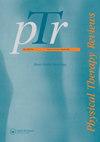Systematic review of clinical decision-makers’ attitudes, beliefs, and biases that contribute to a marginalized process of care in persistent musculoskeletal pain. Part II: case vignettes
IF 0.8
Q4 REHABILITATION
引用次数: 1
Abstract
Abstract Background Healthcare clinical decision makers’ (CDMs) attitudes, beliefs, and biases can negatively contribute to both clinical conversations and subsequent inequitable management decisions in persistent musculoskeletal pain (PMP). Understanding the factors that may contribute to CDMs’ decisions is particularly important for vulnerable patient populations. Objectives The aim of this systematic review was to synthesize the current research investigating the impact of CDM’s attitudes, beliefs, and biases on the process of care in PMP management in adults. Methods A systematic search following PRISMA guidelines was run in five databases: CINAHL, PubMed, Scopus, Sociology Database in ProQuest, and Web of Science. Included studies: vulnerable adult populations with chronic pain. Methodological quality was assessed with the Downs and Black tool. Results Nine studies were included. Studies examined CDMs’ perceptions of case vignettes used in medical schools, allied health professional programs, and in healthcare settings. Implicit biases related to pain severity and favoring medical evidence influenced CDMs’ perceptions of case legitimacy. Pharmaceutical management decisions were influenced by race/ethnicity, gender, pain severity, medical evidence, and non-verbal patient behavior. Pain severity influenced non-pharmaceutical management decisions. Conclusion Implicit biases related to race/ethnicity, gender, supporting medical evidence, and pain severity were demonstrated in educational settings and persisted in clinical settings. Health professional curricula should include training with a focus on outcomes that demonstrate increased awareness of the factors that could lead to inequitable management decisions. Addressing biases during the training of CDMs will be necessary to improve congruency of clinical conversations and minimize marginalization of patient care in PMP.对临床决策者的态度、信仰和偏见进行系统审查,这些态度、信念和偏见有助于持续性肌肉骨骼疼痛的边缘化护理过程。第二部分:案例小插曲
摘要背景医疗保健临床决策者(CDM)的态度、信念和偏见会对持续性肌肉骨骼疼痛(PMP)的临床对话和随后的不公平管理决策产生负面影响。了解可能有助于CDM决策的因素对弱势患者群体尤为重要。目的本系统综述的目的是综合当前研究CDM的态度、信念和偏见对成人PMP管理中护理过程的影响。方法遵循PRISMA指南,在CINAHL、PubMed、Scopus、ProQuest中的社会学数据库和Web of Science五个数据库中进行系统搜索。纳入研究:患有慢性疼痛的脆弱成年人群。使用Downs和Black工具评估方法学质量。结果纳入9项研究。研究调查了CDM对医学院、联合健康专业项目和医疗环境中使用的病例小插曲的看法。与疼痛严重程度相关的隐性偏见和倾向于医学证据影响了CDM对案件合法性的看法。药物管理决策受到种族/民族、性别、疼痛严重程度、医学证据和非语言患者行为的影响。疼痛严重程度影响非药物管理决策。结论与种族/民族、性别、支持医学证据和疼痛严重程度相关的内隐偏见在教育环境中得到了证实,并在临床环境中持续存在。卫生专业课程应包括以结果为重点的培训,这些结果表明对可能导致不公平管理决策的因素的认识有所提高。为了提高临床对话的一致性并最大限度地减少PMP中患者护理的边缘化,有必要在CDM培训期间解决偏见。
本文章由计算机程序翻译,如有差异,请以英文原文为准。
求助全文
约1分钟内获得全文
求助全文
来源期刊

Physical Therapy Reviews
REHABILITATION-
CiteScore
1.30
自引率
0.00%
发文量
26
期刊介绍:
Physical Therapy Reviews is an international journal which aims to publish contemporary reviews, discussion papers and editorials within physical therapy, and in those basic and clinical sciences which are the basis of physical therapy. The journal is aimed at all those involved in research, teaching and practice within the area of physical therapy. Reviews (both descriptive and systematic) are invited in the following areas, which reflect the breadth and diversity of practice within physical therapy: •neurological rehabilitation •movement and exercise •orthopaedics and rheumatology •manual therapy and massage •sports medicine •measurement •chest physiotherapy •electrotherapeutics •obstetrics and gynaecology •complementary therapies •professional issues •musculoskeletal rehabilitation
 求助内容:
求助内容: 应助结果提醒方式:
应助结果提醒方式:


